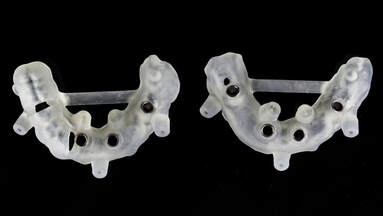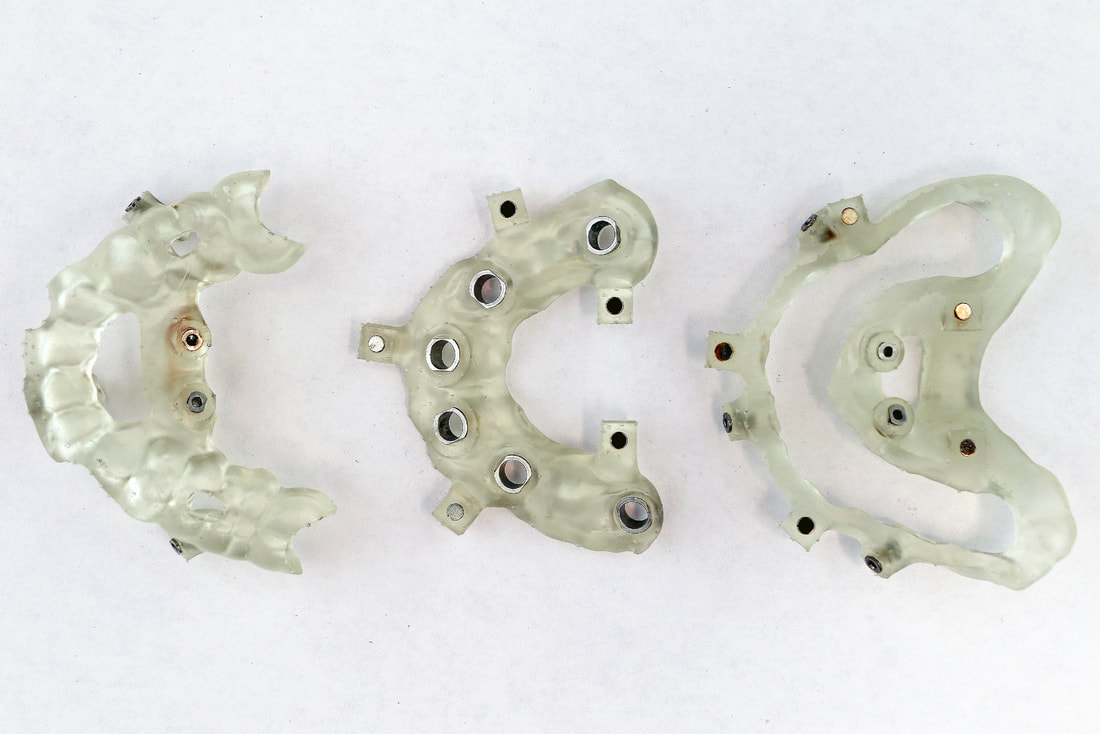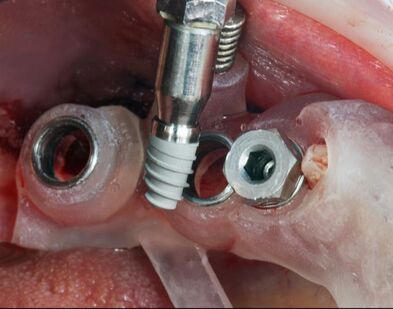Surgical Guide for Dental Implants The Dental Lab creates advanced implant guides through a digital workflow. Our goal is to assist dentists in implant guided surgery. We customize each through a design tutorial to determine drilling and implant placement. The guide accounts for and fit to the teeth, bones, and tissues. It also allows flexibility and determines the vessels and resilience of gum tissue.
|
What is a Dental Surgical Guide?Digital dental surgery follows a template for proper angulation and guided implant placement. Dentists use them during dental surgery to identify where the implants should go. They help ensure the placement of implant restorations in the right spots.
We make surgical guides with computer-aided design and manufacturing. They use the images from computerized tomography or cone-beam computed tomography scanning. The guide helps to transfer the pre-mapped plans to the implant site. We design guided implant placement, angulation, depth, and drilling sequence via software. The software provides a 3D image of the edentulous space and serves as a visual aid for proper placement. We can see the final prosthesis through virtual design before any surgical intervention. This maximizes the smile design and emergence profile of the final design. Surgical guides are famous for accuracy and precision for placement. Many favor them because they are a less invasive approach to implant surgery. They result in less treatment time and eliminates second-stage implant surgery.
SURGICAL GUIDES OFFERED AT THE DENTAL LABTooth Supported Guide
Bone Borne Guide
Mucosa Supported Guide
|
|
What are Dental Implants?
A dental implant is a medical device that serves as a replacement for tooth roots. It is a titanium post that is secured in the jawbone and functions to support an artificial tooth. It is placed through implant surgery. Over time, the post integrates or fuses with the jawbone for enhanced stability. They can also help to stimulate the jawbone and prevent atrophy or bone resorption.
Implants can be used for a variety of fixed and removable prosthesis. They can also be used for provisional restoration. They can support single tooth crowns, bridges, and full arch dentures. They often result in the most natural-looking and natural-feeling solutions for missing teeth. Implant supported prostheses do not move when talking, laughing, or chewing.
Implants can be used for a variety of fixed and removable prosthesis. They can also be used for provisional restoration. They can support single tooth crowns, bridges, and full arch dentures. They often result in the most natural-looking and natural-feeling solutions for missing teeth. Implant supported prostheses do not move when talking, laughing, or chewing.
Appropriate positioning of implants and preoperative planning are vital. They are vital to attaining long-term aesthetics, functional success, and prosthesis survival. Virtual implant planning is superior when it comes to proper implant positioning. Doctors can diagnose patients and plan cases in a 3D tutorial. Then, they can transfer those plans to the patient’s mouth with the 3D printed guide.
Implant Treatment Protocol1. Computerized tomography scanning
2. Software program execution 3. Fabrication of surgical drilling guides 4. Surgical procedure |
GUIDE OPTIONS
|
WHAT TO SEND THE LAB FOR SURGICAL GUIDES
- Full arch PVS impression, model with bite registration, or intraoral scan
- Bite registration
- CBCT scan (less than 6 months old)
- Analog
- Stock Abutment
We can accept DICOMS from any CT scanner (full DICOM data set) and .STL files from any intraoral scanner
Conditions and Indications Prior to Treatment
The ideal outcome consists of optimal occlusion and support for peri-implant tissues health. There are several aspects to consider before planning any dental implant reconstruction. Doctors must determine the ideal materials and what kind of support is necessary. Whether a single space or many are being filled can help determine a doctor's choice.
Uncontrolled medical conditions can also impact the survival of the implant. Such conditions may be diabetes or immunosuppressive diseases. Moreover, bleeding conditions are not ideal for surgery and may be a contraindication. Medication, such as bisphosphonates, can also impact integration and may inhibit bone healing.
Doctors must also consider the quantity and quality of hard tissue available. Additionally, is there adequate vertical and horizontal bone to support the implant? The width of bone should allow at least 1 to 2 millimeters (mm) of facial and lingual cortical bone. The height should be able to support a 1:1 crown-to-root ratio. Computer-assisted guidance allows <2 mm linear deviation error and angular deviance of <5°.
Uncontrolled medical conditions can also impact the survival of the implant. Such conditions may be diabetes or immunosuppressive diseases. Moreover, bleeding conditions are not ideal for surgery and may be a contraindication. Medication, such as bisphosphonates, can also impact integration and may inhibit bone healing.
Doctors must also consider the quantity and quality of hard tissue available. Additionally, is there adequate vertical and horizontal bone to support the implant? The width of bone should allow at least 1 to 2 millimeters (mm) of facial and lingual cortical bone. The height should be able to support a 1:1 crown-to-root ratio. Computer-assisted guidance allows <2 mm linear deviation error and angular deviance of <5°.
Treatment PlanningSuccessful cases need a certain degree of preplanning. Yet, struggling is not uncommon due to the amount of work that goes into planning. At The Dental Lab, we recognize that the dental industry is always changing. With more advanced technology can come more complex treatments. That is why we at the Lab are proud to offer you and your practice pretreatment case planning.
|
What is Treatment Planning?
Case planning is allowing a technical staff member to manage each step of your dental case. From troubleshooting to material selection, we take over to plan a process to follow. Maximize chair time, profitability, lab results, and exceed the expectations of patients. A knowledgeable case planner can make the difference between acceptable and extraordinary results.
- Maximize your chair time
- Define the logistics of case completion
- Get individualized support
THE DENTAL LABThe Dental Lab in Pennsylvania is a full-service dental lab. We offer restorative products and implant systems for dentists across the United States.
|
Our mission is to provide reliable and predictable dental restorations. We use the most advanced technology in digital dentistry. We marry low costs with CAD/CAM and technicians to make all restorative dental products. Our digital products include dentures, implants, orthodontics, crowns, and bridges.
|
HELP US PROTECT YOUR CASES.
If you do not have the proper supplies, please contact us. We are happy to assist you and have technicians available for questions or concerns. If you are a new customer, please call at 215-293-9760 for a welcome kit. The kit includes everything you will need to send your first case to our laboratory. We look forward to a successful partnership.
Please note that our business hours are Monday through Friday, 8:30 am to 5 :00 pm EST.
Please note that our business hours are Monday through Friday, 8:30 am to 5 :00 pm EST.


